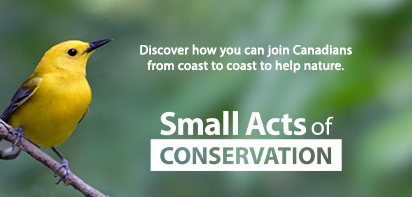Internationally significant Turkey Point Marsh conserved by Nature Conservancy of Canada
Coastal wetlands a priority for local conservation efforts
Internationally significant coastal wetlands on the northern shores of Lake Erie are now protected, marking the culmination of a multi-year conservation project. Counting 167 hectares of thriving marsh and forest in the Turkey Point Marsh complex on Long Point Inner Bay, The Nature Conservancy of Canada’s (NCC) latest work in the area features vital habitat for reptiles, amphibians, birds and fish.
The newly conserved area is bordered by other conservation lands, making this a strategic priority for NCC, as it allowed the organization to expand and connect an existing network of protected lands. These collective efforts help ensure a diverse and more resilient natural landscape, and conserve adequate space for species to feed, move, breed, nest and thrive throughout their life cycle.
The Long Point wetland complex, which includes Turkey Point Marsh, is considered one of the most important stopover areas for many species of ducks and other migratory birds. The property also supports swamp forest and deciduous forest, providing habitat for species at risk such as prothonotary warbler and Louisiana waterthrush. The site’s wetlands provide important ecosystem services for communities by lessening the risk of flooding, protecting coastal areas from erosion, filtering water and storing carbon.
This land purchase was made possible by the support of many private donors and foundations, as well as the Government of Canada, through the Natural Heritage Conservation Program, part of Canada’s Nature Fund, and the Government of Ontario, through the Greenlands Conservation Partnership program.
This project showcases how NCC is accelerating the pace of conservation in Canada. Over the next few years, the organization will double its impact by mobilizing people and delivering permanent, large-scale conservation. In the face of rapid biodiversity loss and climate change, nature is our ally. There is no solution to either without nature conservation.
Quotes
“The Turkey Point Marsh is a stunning example of thriving wetlands that are teeming with biodiversity among a resilient landscape. The Nature Conservancy of Canada is grateful for the enduring legacy and spirit of conservation in the Long Point region, and we look forward to playing an active role in the management of the Turkey Point Marsh property so that the species here continue to thrive for generations to come.” – Kristyn Richardson, Program Director – Southwestern Ontario, Nature Conservancy of Canada
“By teaming up with the Nature Conservancy of Canada, we’re expanding and connecting existing protected land; taking steps to help protect one of the most important stopover areas for many species of ducks; and helping to protect species at risk, like the Prothonotary Warbler and the Louisiana Waterthrush. We are on a mission to conserve 30 percent of land and water in Canada by 2030, and the Government of Canada’s Natural Heritage Conservation Program is leading the charge.”– The Honourable Steven Guilbeault, Minister of Environment and Climate Change
“The protection of this provincially significant wetland is a victory for the preservation of our natural environment. With our government’s support, this 167-hectare (about 412 acres) of thriving marsh will play an important role locally by acting as a natural infrastructure safeguard against flood control and erosion. Its proximity to Turkey Point Provincial Park also ensures that it will continue to be a treasure for both wildlife and visitors, enriching the biodiversity of this beautiful natural area.” – Andrea Khanjin, Minister of the Environment, Conservation, and Parks
Facts
- The Turkey Point Marsh property supports high biodiversity, and thousands of waterfowl use the wetlands as staging, stopover and foraging habitat.
- Almost the entire property is designated as a Provincially Significant Wetland and a Provincial Area of Natural and Scientific Interest. It is also within the Long Point Peninsula and Marshes Important Bird/Key Biodiversity Area.
- Common reed has been managed on the property as part of a landscape-level control program in the marshes of Big Creek, Long Point and Turkey Point, led by NCC. Control work has been ongoing since 2018 and is now limited to sparse patches.
- Norfolk County is a biodiversity hotspot and part of the Carolinian Life Zone.
- The Southern Norfolk Sand Plain contains provincially and globally significant wetlands, habitat that is critical for migratory birds, and provincially and federally protected areas.
- Nearby parts of Norfolk County are designated as a UNESCO World Biosphere Reserve.
- More than 45 provincially, nationally or globally rare plants and animals live in this natural area, and it has one of the highest densities of rare and endangered species in Canada.
- In advance of the United Nations’ biodiversity and climate conferences this fall, the Nature Conservancy of Canada and the International Land Conservation Network (ILCN) are hosting the world’s conservation leaders in Mont-Sainte-Anne, Quebec, from October 16 to 18, at the 2024 Global Congress of the International Land Conservation Network, presented by RBC. Under the theme “Resilient landscapes for a resilient world,” civic and private land conservation experts from six continents will share resources and chart a path to achieve the global target of conserving 30 per cent of the planet’s lands and waters by 2030. This target is what nature needs if we’re to protect biodiversity on Earth and safeguard communities from the impacts of climate change.
About
The Nature Conservancy of Canada (NCC) is the country’s unifying force for nature. NCC seeks solutions to the twin crises of rapid biodiversity loss and climate change through large-scale, permanent land conservation. As a trusted partner, NCC works with people, communities, businesses and government to protect and care for our country’s most important natural areas. Since 1962, NCC has brought people together to conserve and restore more than 15 million hectares. To learn more, visit natureconservancy.ca.
Canada’s Natural Heritage Conservation Program (NHCP) is a unique partnership that supports the creation and recognition of protected and conserved areas through the acquisition of private land and private interest in land. To date, the Government of Canada has invested more than $470 million in the Program, which has been matched with more than $982 million in contributions raised by Nature Conservancy of Canada, Ducks Unlimited Canada and the country’s land trust community leading to the protection and conservation of nearly 800,000 hectares of ecologically sensitive lands.
The Greenlands Conservation Partnership program helps conserve ecologically important natural areas and protect wetlands, grasslands and forests that help mitigate the effects of climate change. Through the Greenlands Conservation Partnership program, a total of $38 million has been invested to date by the Ontario government, with an additional $20 million committed through the 2024 Ontario Budget. Additional match funds are raised from other sources, such as individual donations and foundation support through NCC and the Ontario Land Trust Alliance, and other levels of government.
Find photos and video here
Learn More
Follow us on on X (formerly Twitter): x.com/NCC_CNC | x.com/NCC_CNCMedia
Find us on Facebook
- 30 -




